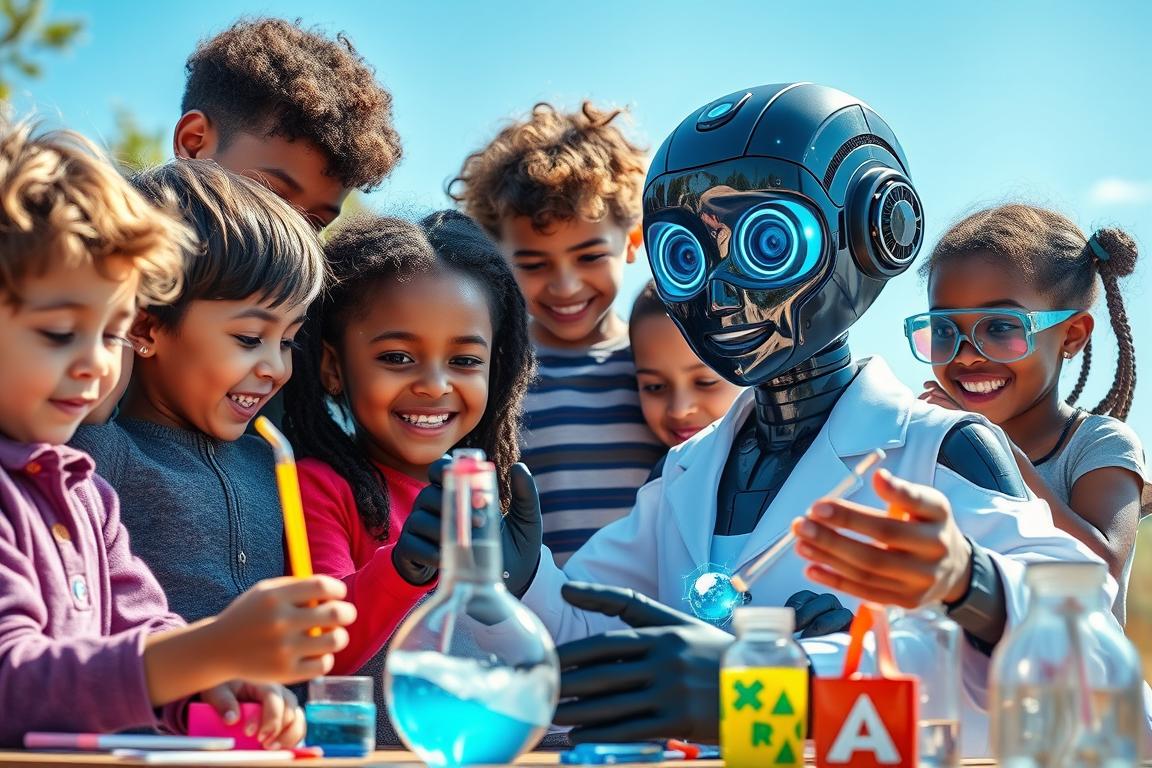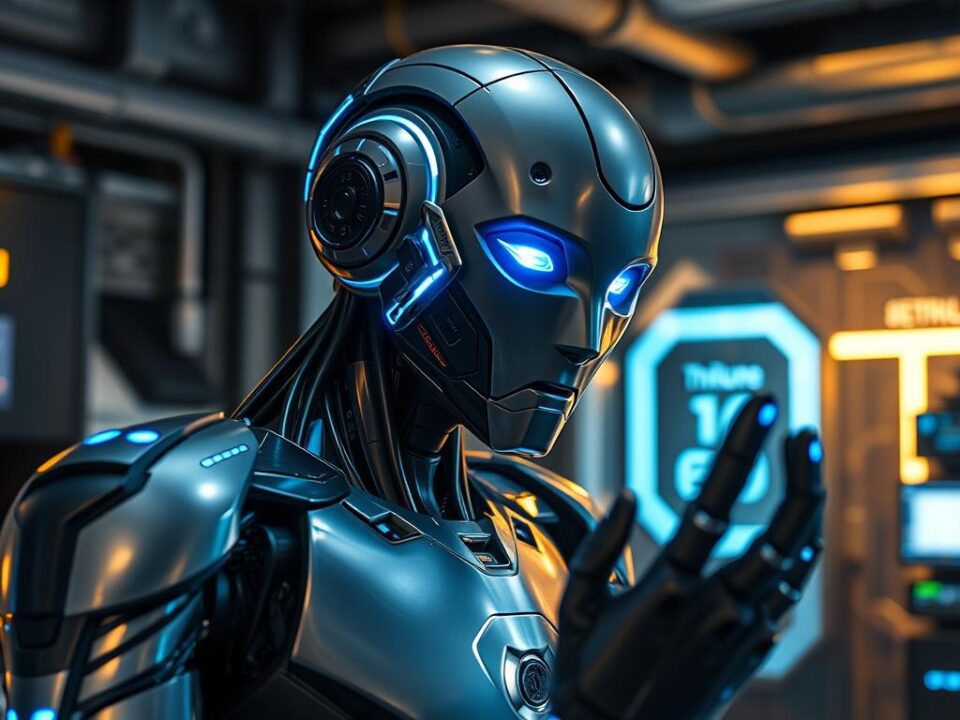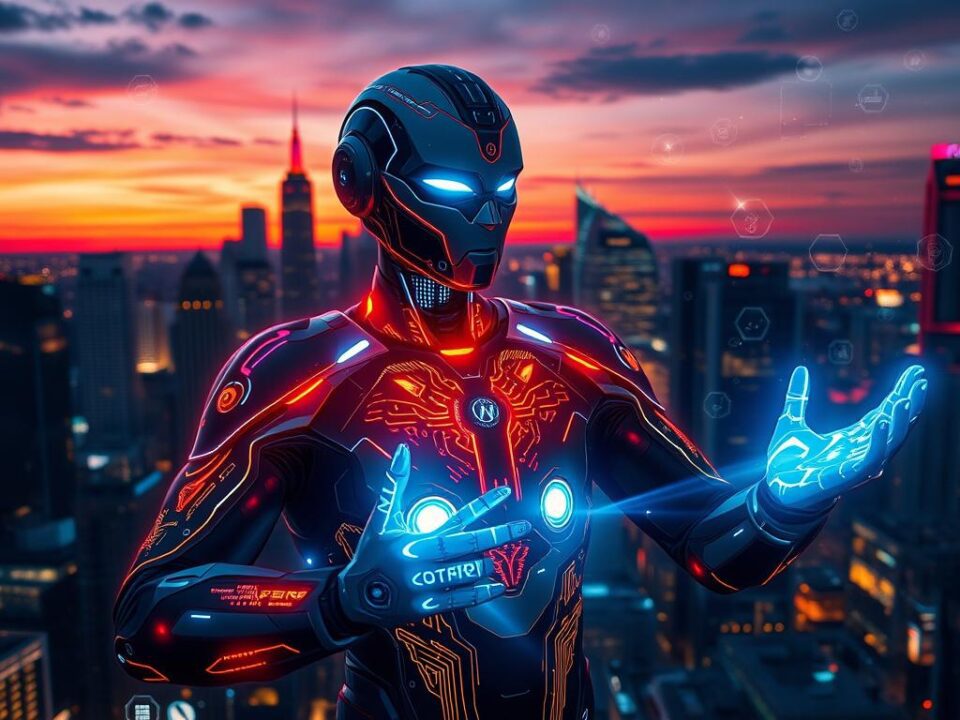Welcome to an exciting journey where children can discover the joy of kids science with Astro, their very own AI scientist friend! Today, educational technology is changing how young learners learn about science. It makes learning more fun and interactive.
By working with Astro, kids can dive into a world of creativity and curiosity. This brings science to life in a way that’s both exciting and educational.
Over 650,000 participants have joined courses like “Elements of AI.” This shows a big interest in how artificial intelligence can help us every day. The bond kids form with Astro is key to making science fun. It also sparks a love for learning more.
Introduction to Your AI Scientist Friend
Science education has seen a big change with the arrival of AI assistants. Astro AI is a great example. It’s a friendly AI designed to help kids learn about science. Astro uses cool AI tricks to make learning fun and interactive.
Who is Astro?
Astro is a smart AI made just for kids. It helps with science projects, guiding them through experiments. Astro has a cool look and a friendly vibe, making it a great study buddy.
What Can Astro Do?
Astro can do lots of cool things:
- Answering questions: Kids can ask Astro about science and get easy-to-understand answers.
- Guiding experiments: Astro helps plan and do science experiments, making learning fun.
- Providing interactive learning experiences: This AI assistant boosts critical thinking by encouraging kids to explore and ask questions.
- Summarizing findings: After experiments, Astro helps kids understand the results and what they mean.
The Role of AI in Scientific Exploration
Artificial intelligence is changing how scientists explore the world. It helps them understand huge amounts of data. Thanks to AI, scientists can now do their work more efficiently and accurately.
Understanding Machine Learning
Machine learning is key to AI’s power. It lets computers learn from data on their own. This is super useful in complex fields like genomics and astrophysics.
For example, AlphaFold has made huge strides in predicting protein structures. It shows how AI can be better than old methods.
Data Analysis and Interpretation
AI has made data analysis much better. It can spot patterns and make predictions that humans can’t. The Nobel Prizes have recognized AI’s role in big discoveries in physics and chemistry.
AI helps scientists understand data from the James Webb Space Telescope. This data is too complex for humans to handle alone.
AI also improves how scientists interpret data. It helps avoid biases found in traditional methods. For instance, AI can encourage publishing of all results, not just positive ones.
This leads to a deeper understanding of science. The mix of human and AI intelligence is driving new discoveries.
How Astro Makes Learning Fun
Astro makes learning fun for kids in many ways. He uses interactive learning to keep them engaged. Kids enjoy fun experiments that teach them about science.
By mixing hands-on activities with exciting games, Astro sparks curiosity. This approach makes science fascinating and fun.
Interactive Experiments
Astro introduces kids to cool fun experiments. They get to do things like:
- Building simple circuits to explore electricity
- Creating volcanoes to understand chemical reactions
- Growing crystals to observe changes in matter
These kids science activities are not just fun. They also help kids think critically and solve problems.
Engaging Games and Activities
Astro has lots of educational games to help kids learn. These games encourage teamwork and keep kids excited about learning. Some examples are:
- Science trivia that challenges their knowledge
- Interactive simulations of ecosystems and environments
- Puzzles that need scientific thinking to solve
This mix of interactive learning and fun challenges makes learning rewarding. It helps kids develop a love for science.
Real-World Applications of AI in Science
AI is changing many fields with new solutions that make things better and more accurate. In science, it’s making a big difference in two key areas: medical breakthroughs and studying the environment. Let’s look at how AI is changing these fields.
Medical Advancements
In medicine, AI is leading to big improvements in finding and treating diseases. It uses big data to help doctors make better choices. For example, AI can look at medical images very well, helping find diseases like cancer early.
This early detection can lead to better treatments for patients. It’s all about making care more personal and effective.
Environmental Research
AI is also key in studying the environment. It helps analyze climate data and predict changes. Scientists use AI tools to watch ecosystems, count wildlife, and see how humans affect the environment.
AI models can predict what might happen in the future, like how climate change will affect us. This helps in saving nature and guides policies to protect our planet.
Collaborating with Astro for Scientific Projects
Working with Astro creates a special place for learning together, especially in science. Kids get to learn about tough science topics and work as a team. This teamwork makes learning fun and full of discovery and creativity.
Tips for Effective Collaboration
To get the most out of working with Astro, try these tips:
- Communicate Clearly: Make sure everyone talks openly to share ideas and thoughts.
- Brainstorm Together: Come up with lots of project ideas by getting everyone involved.
- Assign Roles: Give tasks based on what each person is good at to work better together.
- Stay Organized: Use schedules and lists to keep the project moving forward.
- Reflect and Adjust: After each step, talk about what’s working and what can be better.
Project Ideas with Astro
Doing Astro projects makes learning fun and helps kids remember science better. Here are some cool ideas:
- Do simple experiments to see how the world works, with Astro helping with how to do it.
- Look into cool topics in space or biology, with Astro adding more cool facts.
- Make pictures or models of what you’ve learned from your experiments, showing off teamwork.
- Learn about the universe, focusing on how galaxies change, to understand big space ideas.
Astro’s Favorite Scientific Topics
Astro loves exploring different scientific fields, especially astronomy and biology. These subjects open up a world of knowledge. They also show how life on Earth is connected through ecosystems.
Astronomy and Space Exploration
Astronomy is a favorite of Astro because of its vastness and mysteries. Kids can learn about:
- The solar system and its fascinating planets
- The birth and death of stars
- Black holes and their enigmatic properties
- Galaxies and the observable universe
Astro makes space exploration exciting for kids. This sparks their curiosity and makes them excited about our place in the universe.
Biology and Ecosystems
Astro is also passionate about biology and ecosystems. These topics teach kids about:
- The diversity of life forms on Earth
- How ecosystems function and sustain each other
- The importance of biodiversity for a balanced environment
- Interactions between organisms and their habitats
Astro helps kids understand the web of life. This encourages them to care more about the environment.
The Future of AI in Scientific Research
Scientific research is changing fast, thanks to AI. Researchers are now using AI more, blending human smarts with machine power. This mix is changing how we do research and what we find out.
Emerging Technologies
New tech is making AI in research even better. Tools like those from Microsoft and Tesla help scientists work faster. They can make guesses and test ideas like humans do.
These tools are also making teams work better. Over 450,000 experts are using them to improve research. This shows how AI is making science better and faster.
Predictions for AI Development
AI is making research faster and easier. It helps scientists by doing the hard work of data analysis. This lets them focus on the big ideas.
Places like the Eric and Wendy Schmidt AI in Science Postdoctoral Fellowship are backing AI. They’re investing in AI for science, showing it’s the future. As AI gets better, it will play a bigger role in science.
Overcoming Challenges with AI in Science
AI is becoming more common in science, but it brings challenges. A big part of understanding AI is knowing the misconceptions in science that come up. Many think AI is as smart as humans, but it’s not. AI is really good at finding patterns and analyzing data, not understanding things like humans do.
Common Misconceptions
One big misconception in science is thinking AI can do everything humans can. But AI needs good data to work well. If the data is wrong, AI can make mistakes, known as “AI hallucinations.”
These mistakes happen when AI is not trained right or has bad algorithms. This shows why we need to use AI responsibly.
- AI cannot think or understand in the human sense; it merely analyzes data.
- Constant monitoring and validation of AI outputs are essential to avoid misunderstandings.
- AI does not possess memory in the way humans do, often requiring reminders.
Ethical Considerations
AI also raises big ethical questions in science. Things like keeping data private, avoiding bias, and making sure AI doesn’t make big mistakes are key. For example, in banks, AI mistakes can cost a lot of money. In factories, AI errors can let bad products out.
To solve these problems, we need to use AI wisely. This means better data management and making sure data is good. By working together and being open, we can avoid AI’s downsides. As we use more AI in science, we must keep its ethics in mind to make things better for everyone.
Getting Started with Astro: A Step-by-Step Guide
Starting your journey with Astro opens a world of discovery and learning. It might seem hard to begin with AI, but with clear steps, you can easily start. Learning how to use Astro’s features is key.
Setting Up Your Interaction
First, create an account on Astro. This gives you access to features tailored just for you. After signing up, get to know the chat interface. It answers your questions about astrology and more.
Using Astro regularly unlocks its full power. It helps you grow and learn more.
Utilizing Resources and Tools
Make your experience better by using educational resources. Check out tutorials and webinars on AI and Astro. Reading books and articles on astrology can also help.
Using tools like apps can make your learning even better. They offer extra help and insights, helping you grow.
Conclusion: Embrace the Future with Astro
In today’s world, AI is changing how we learn. Astro is a key player in this change, blending science and tech for kids. It’s not just a tool; it’s a spark for curiosity and innovation in science.
As we explore AI, we see its power in making science exciting. It turns learning into an adventure, not a task.
The Importance of Science and AI
AI makes complex science easy to understand. This is key for raising future scientists. Astro offers interactive ways for kids to learn science hands-on.
By doing so, kids learn to ask questions, think deeply, and get involved in their learning. This approach is essential for their growth.
Join the Adventure with Astro
We invite you to explore with Astro. This journey is full of discovery and learning. It shows how AI can change education.
As kids learn with Astro, they build a strong base for the future. With Astro, the sky is the limit for their learning.







